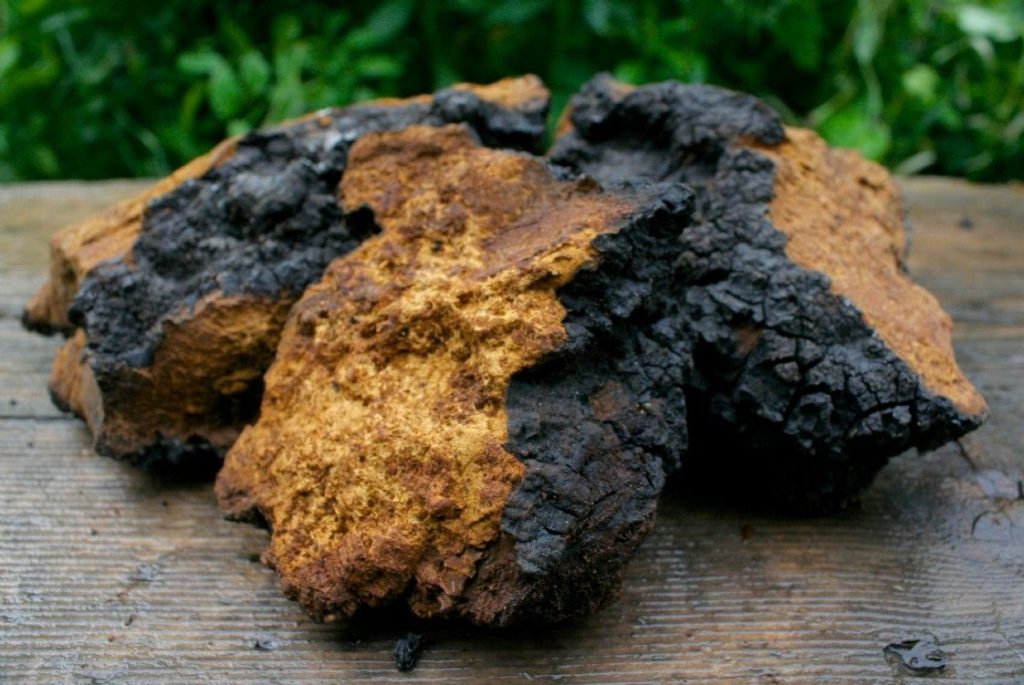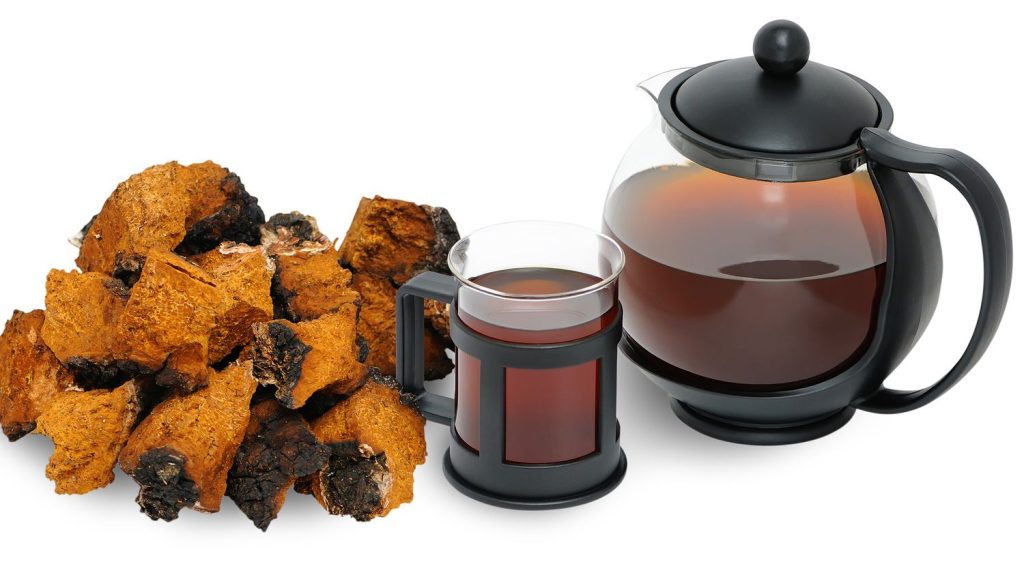The Remarkable Benefits of Chaga Mushroom: Nature’s Superfood

Chaga mushroom (Inonotus obliquus) has long been treasured for its medicinal properties. Growing primarily on birch trees in colder regions such as Siberia, Scandinavia, and North America, Chaga stands out with its charred, blackened exterior. Historically embraced in Russia, Korea, and Eastern Europe, Chaga’s bioactive components have been extensively studied for their potential therapeutic applications. This article delves into Chaga’s health benefits, preparation methods, and versatile ways to incorporate it into daily routines.

A Nutritional Powerhouse
Chaga mushroom is rich in polysaccharides, triterpenoids, polyphenols, and melanin. Each of these compounds contributes to its impressive medicinal properties:
- Polysaccharides: Known for their immunomodulatory, antioxidant, and hypoglycemic effects.
- Triterpenoids: Possess anticancer, anti-inflammatory, and antiviral properties.
- Melanin: A powerful antioxidant with potential protective effects against UV damage.
- Polyphenols: Renowned for their ability to neutralize free radicals and reduce oxidative stress.

Health Benefits of Chaga Mushroom
1. Anticancer Potential
Multiple studies underscore Chaga’s anticancer properties. The polysaccharides in Chaga enhance the body’s immune response, targeting cancer cells and suppressing tumor growth. According to a review published in Polymers (2021), Chaga polysaccharides modulate key signaling pathways such as NF-κB, known to regulate inflammatory responses in cancer cells. Chaga’s triterpenoids, including betulinic acid derived from birch bark, also exhibit apoptosis-inducing effects on cancer cells.
For instance, research on human non-small cell lung cancer cells (A549) demonstrated that Chaga inhibited the Akt/NF-κB signaling pathway, thereby reducing cell invasion and metastasis. Additionally, studies have reported that Chaga extracts can suppress colorectal, ovarian, and liver cancer cell proliferation, making it a promising adjunct to conventional treatments.
2. Antioxidant Powerhouse
Chaga’s antioxidant capacity surpasses that of many other medicinal fungi. The mushroom’s high melanin content and polyphenols help neutralize free radicals, reducing oxidative damage at the cellular level. According to findings from the Heliyon (2024) review, Chaga protects DNA from oxidative stress, a major contributor to aging, cancer, and chronic diseases. Beta-glucans in Chaga further bolster its antioxidant effects by enhancing the activity of superoxide dismutase (SOD), an enzyme crucial for cellular defense against oxidative damage.
3. Anti-inflammatory Properties
Chaga’s polysaccharides and triterpenoids exhibit potent anti-inflammatory effects by regulating cytokine production and inhibiting key inflammatory mediators such as IL-1β and TNF-α. Studies have shown that Chaga reduces the activation of the NF-κB pathway, which plays a significant role in inflammatory diseases. This makes Chaga a valuable natural remedy for conditions such as arthritis, digestive inflammation, and chronic autoimmune disorders.
4. Blood Sugar Regulation
Chaga polysaccharides have demonstrated hypoglycemic effects, helping regulate blood sugar levels and improve insulin sensitivity. Research indicates that Chaga may inhibit the enzymes α-amylase and α-glucosidase, which break down carbohydrates into glucose. This action slows the absorption of glucose, thereby preventing sharp post-meal blood sugar spikes. Animal studies highlighted in the Polymers review showed significant improvements in glucose tolerance and reduced insulin resistance in diabetic mice following Chaga supplementation.
5. Cholesterol Management and Heart Health
Chaga may also play a role in reducing cholesterol levels and improving lipid metabolism. By enhancing the activity of lecithin-cholesterol acyltransferase (LCAT), Chaga facilitates the removal of excess cholesterol from tissues and promotes the conversion of low-density lipoproteins (LDL) into high-density lipoproteins (HDL). This process helps maintain arterial health and reduces the risk of cardiovascular diseases.
6. Antiviral and Antimicrobial Effects
Chaga’s antiviral properties have drawn increased attention, particularly in light of recent viral outbreaks. The mushroom’s compounds, such as betulinic acid and melanin, have shown potential in inhibiting viral entry and replication. Studies cited in Heliyon highlight Chaga’s activity against herpes simplex virus (HSV) and human immunodeficiency virus (HIV), with some components demonstrating strong inhibitory effects on viral protease enzymes.
7. Immune System Support
One of Chaga’s most well-known benefits is its immune-modulating properties. Chaga enhances the production of key immune cells, such as macrophages and natural killer (NK) cells. By stimulating the MAPK and NF-κB signaling pathways, Chaga helps regulate immune responses, making it beneficial for combating infections and supporting overall immunity.
How to Prepare and Consume Chaga

1. Chaga Tea
The most popular way to consume Chaga is as a tea:
- Ingredients: 1-2 teaspoons of Chaga powder or a small piece of Chaga.
- Instructions: Simmer the Chaga in water for 20-30 minutes until the liquid turns a rich, dark brown. Strain and serve.
- Tip: Add a dash of cinnamon or a spoonful of honey to enhance the flavor.
2. Chaga Tincture
For a more concentrated form, Chaga tinctures can be used:
- Instructions: Follow a dual extraction method, combining alcohol and water to maximize the extraction of polysaccharides and triterpenoids.
3. Chaga Powder in Smoothies and Soups
- Add a teaspoon of Chaga powder to your morning smoothie or blend it into soups and stews for an earthy, nutrient-rich boost.
4. Chaga Coffee Substitute
- Brew Chaga in place of coffee for a caffeine-free alternative that delivers sustained energy without the jitters.
Incorporating Chaga into Your Health Regimen
1. Daily Immune Support
Consider drinking Chaga tea daily during cold and flu season to bolster your immune defenses.
2. Post-Workout Recovery
Due to its anti-inflammatory properties, Chaga can aid in muscle recovery. Add Chaga tincture to your post-workout hydration routine.
3. Stress Management
Chaga’s adaptogenic qualities may help balance cortisol levels and reduce stress-induced inflammation. A calming cup of Chaga tea in the evening can support relaxation and restful sleep.
4. Skincare Benefits
Chaga’s melanin and antioxidants can be beneficial for skin health. Incorporate Chaga extract into homemade face masks or lotions to help combat oxidative stress and maintain a healthy complexion.
Safety and Precautions
While Chaga is generally considered safe for most individuals, some precautions are necessary:
- Allergies: Individuals allergic to mushrooms should consult a healthcare provider before use.
- Medication Interactions: Chaga may interact with anticoagulant or antidiabetic medications, so caution is advised.
- High Oxalate Content: Chaga contains oxalates, which may contribute to kidney stone formation in susceptible individuals.
Conclusion
Chaga mushroom is a true powerhouse of nutrients and bioactive compounds. Its wide-ranging health benefits—from immune modulation and antioxidant protection to blood sugar regulation and anticancer effects—make it a valuable addition to any health regimen. While more clinical trials are needed to fully understand its mechanisms of action, the current body of research affirms Chaga’s therapeutic potential.
Incorporating Chaga into your daily routine can be as simple as brewing a soothing cup of tea or adding a dash of powder to your favorite recipes. By embracing this ancient remedy, you can tap into nature’s bounty and support your health with one of the most revered medicinal mushrooms in the world.
Disclaimer
This article is for informational purposes only and is not a substitute for professional medical advice, diagnosis, or treatment. Before incorporating Chaga mushroom or any supplement into your diet, especially if you have a medical condition or are taking medications, consult with your healthcare provider.